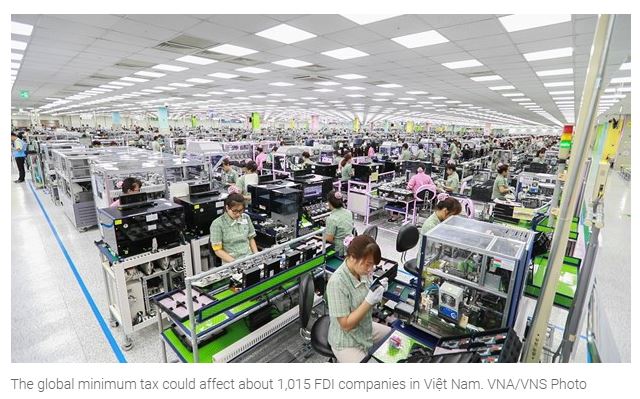Vietnam needs supports for foreign businesses when applying global minimum tax
The global minimum tax of 15 per cent applies to multi-national corporations with annual revenue of 750 million euros, starting from 2024, according to the Ministry of Finance.
HÀ NỘI – The State should consider support for businesses to limit the negative impact of imposing the global minimum tax on investment attraction in Việt Nam, said Đặng Ngọc Minh, Deputy Director of the General Department of Taxation.
The global minimum tax of 15 per cent applies to multi-national corporations with annual revenue of 750 million euros and above, starting from 2024, according to the Ministry of Finance.
Currently, 142 countries and territories have signed up to implement the tax, including Việt Nam. It is estimated that 1,015 FDI companies in Việt Nam will be affected by the tax.
Now, most countries under the European Union, Switzerland, the UK, South Korea, Japan, Singapore, Indonesia, Hong Kong and Australia have confirmed to apply this minimum tax rate from 2024.
South Korea, Singapore and Japan are large foreign investors in Việt Nam, and those countries will have many businesses that are subject to the global minimum tax.
Applying this tax is expected to reduce attractiveness and competitiveness in attracting foreign investment from developing countries, including Việt Nam because existing tax incentives will no longer bring benefits to the businesses. This poses a significant challenge to maintaining the competitiveness of Việt Nam’s investment environment.
According to Minh, countries receiving foreign investment, like Việt Nam, are studying solutions to solve challenges from carrying out the global minimum tax policy, including implementing the Qualified Domestic Minimum Top-up Tax.
Besides the Qualified Domestic Minimum Top-up Tax, some countries are also studying some supportive solutions to retain foreign companies subject to the global minimum tax and attract new foreign companies.
However, the solutions must ensure not to violate the global minimum tax rules and international commitments and practices and ensure transparency, minimising bad impacts on the investment environment, Minh said.
He has also proposed supporting foreign companies in investment in basic infrastructure for production and forming fixed assets for industrial production.
There are supports in environmental protection; housing for workers; social-health insurance for employees; research and development; and application of high and environmentally friendly technology.
To implement the support, Minh said the State also needs to arrange financial resources and land and have training in human resources to maintain the attractiveness and stability of the investment environment.
Việt Nam is a developing country receiving a large amount of foreign investment, so the global minimum tax rules surely affect its investment activities. So, Nguyễn Như Quỳnh, director of the Institute of Financial Strategy and Policy, Ministry of Finance, has said that Việt Nam needs to adjust its policies to adapt to the general rules of the global minimum tax.
In addition, Việt Nam needs to continue to create an attractive investment environment. Still, it must harmonise the interests of investors and Việt Nam’s tax collection rights to ensure State budget revenue.
Quỳnh has also said that amendment of incentive policies on the corporate income tax needs not only to match the implementation of the global minimum tax but also to be synchronous with incentives of other fields to attract investment.
In addition, Việt Nam also needs to create favourable conditions for investors on non-tax policies, such as exemption or reduction of land rent and reform of administrative procedures, to cut costs for businesses, said Quỳnh.
Minister of Finance Hồ Đức Phớc said that the Prime Minister had established a special working team to study and propose solutions related to the global minimum tax that is Pillar Two of the Organisation for Economic Co-operation Development (OECD)’s base erosion and profit-shifting (BEPS) framework.
Accordingly, the Ministry of Finance has also established a working group to assist the Prime Minister’s special working team. They will research and propose solutions for this tax in Việt Nam.
In Việt Nam, tax incentives are used as a financial leverage tool to influence investment trends. Việt Nam’s corporate income tax incentives are considered attractive compared to other countries in the region.
Specifically, the common corporate income tax is 20 per cent, higher than the global minimum tax rate. The preferential rates of 10 per cent, 15 per cent and 17 per cent are applied depending on the industries, sizes and locations of the investment. Notably, some investors are given special rates of just 5 per cent, 7 per cent and 9 per cent. Other incentives have included tax exemption or a 50 per cent reduction.
Suppose Việt Nam applies the minimum tax rate of 15 per cent. It is necessary to amend at least three laws as soon as possible, namely the Law on Investment, the Law on Enterprises, the Law on Corporate Income Tax and other relevant regulations according to international practices. VNS


 English
English




